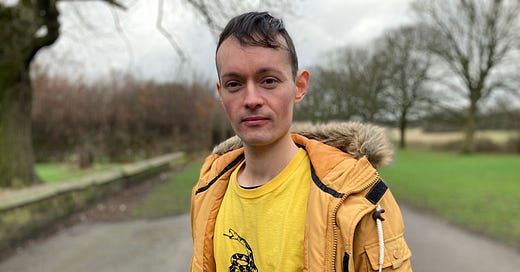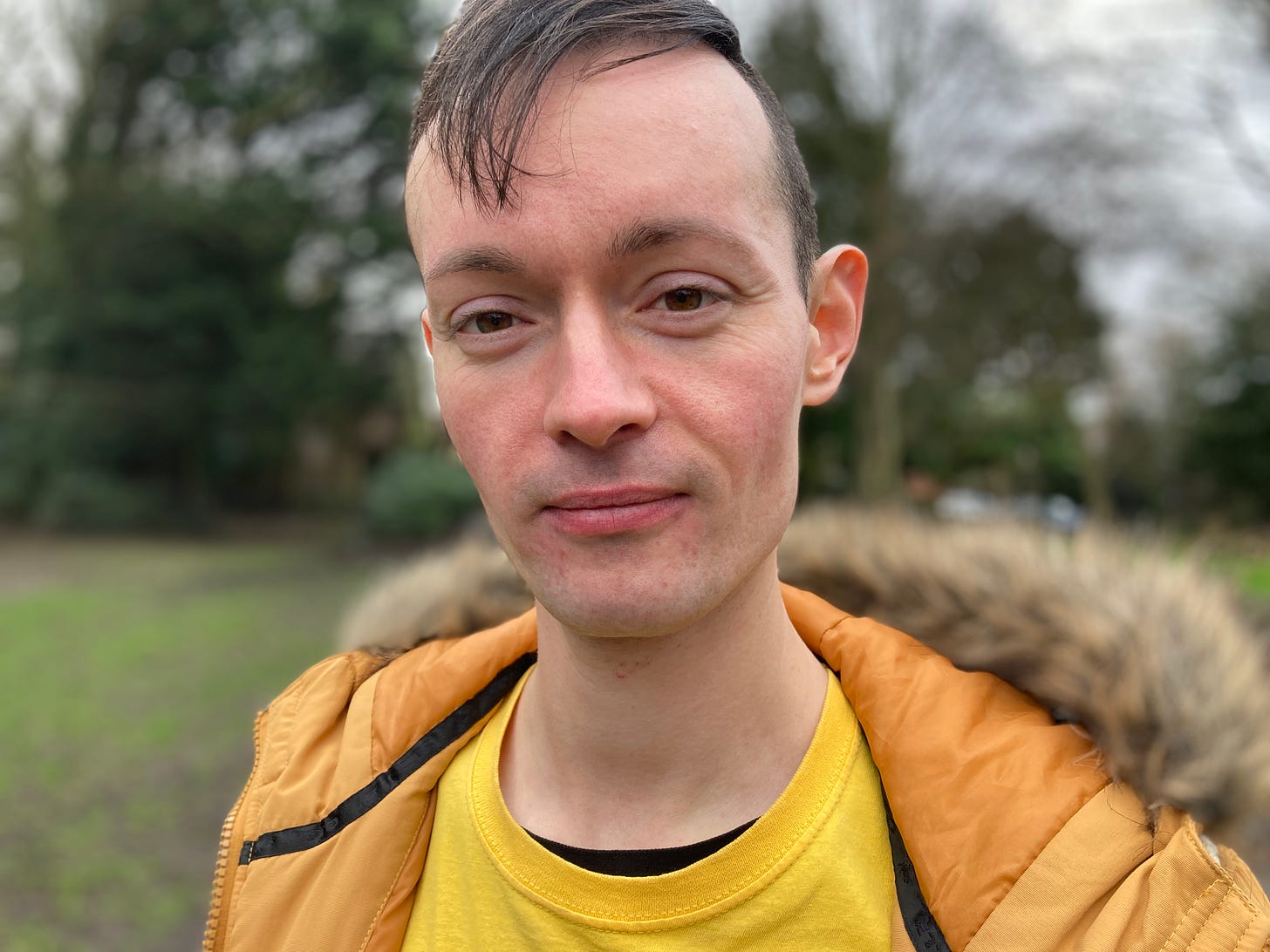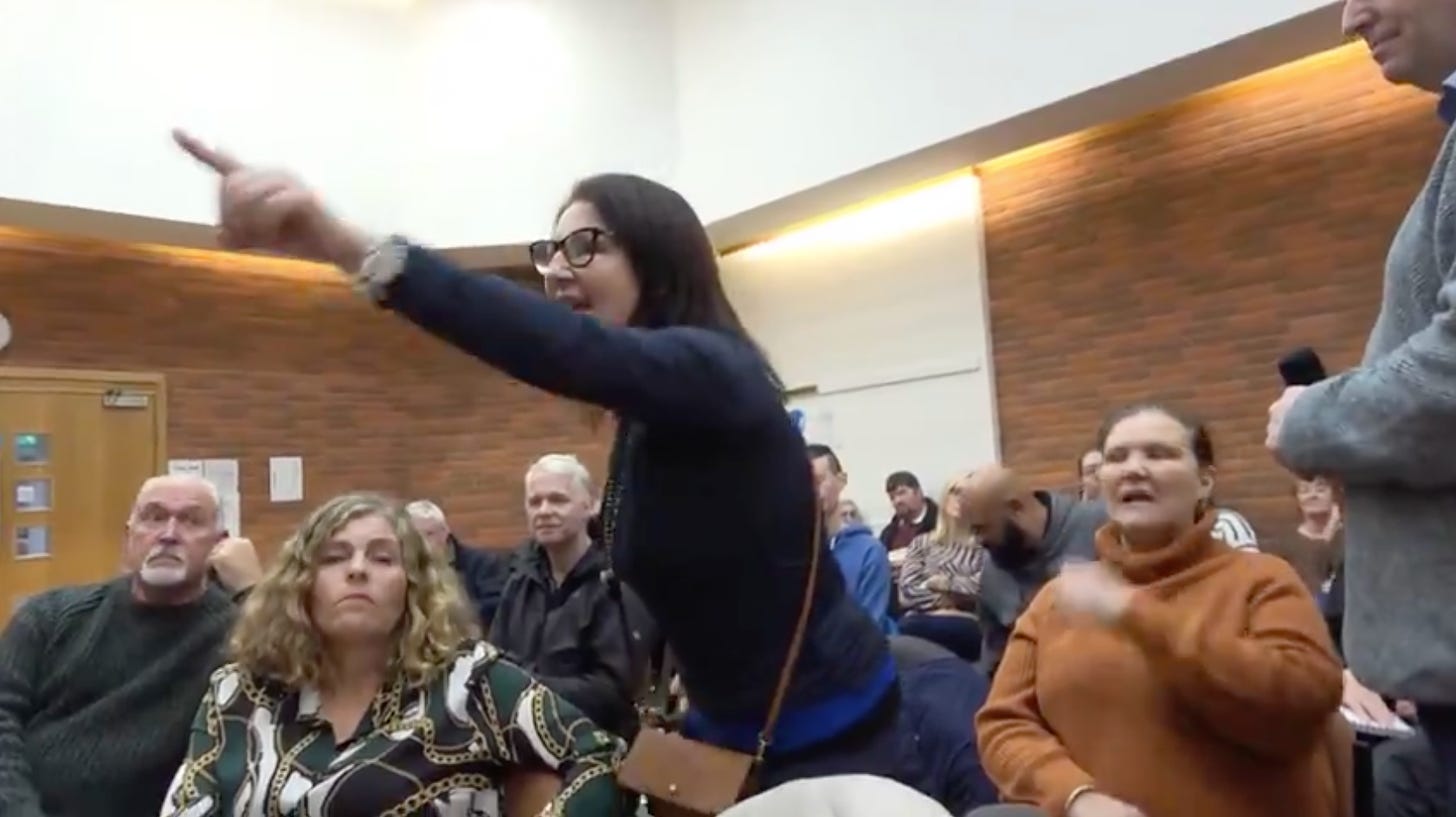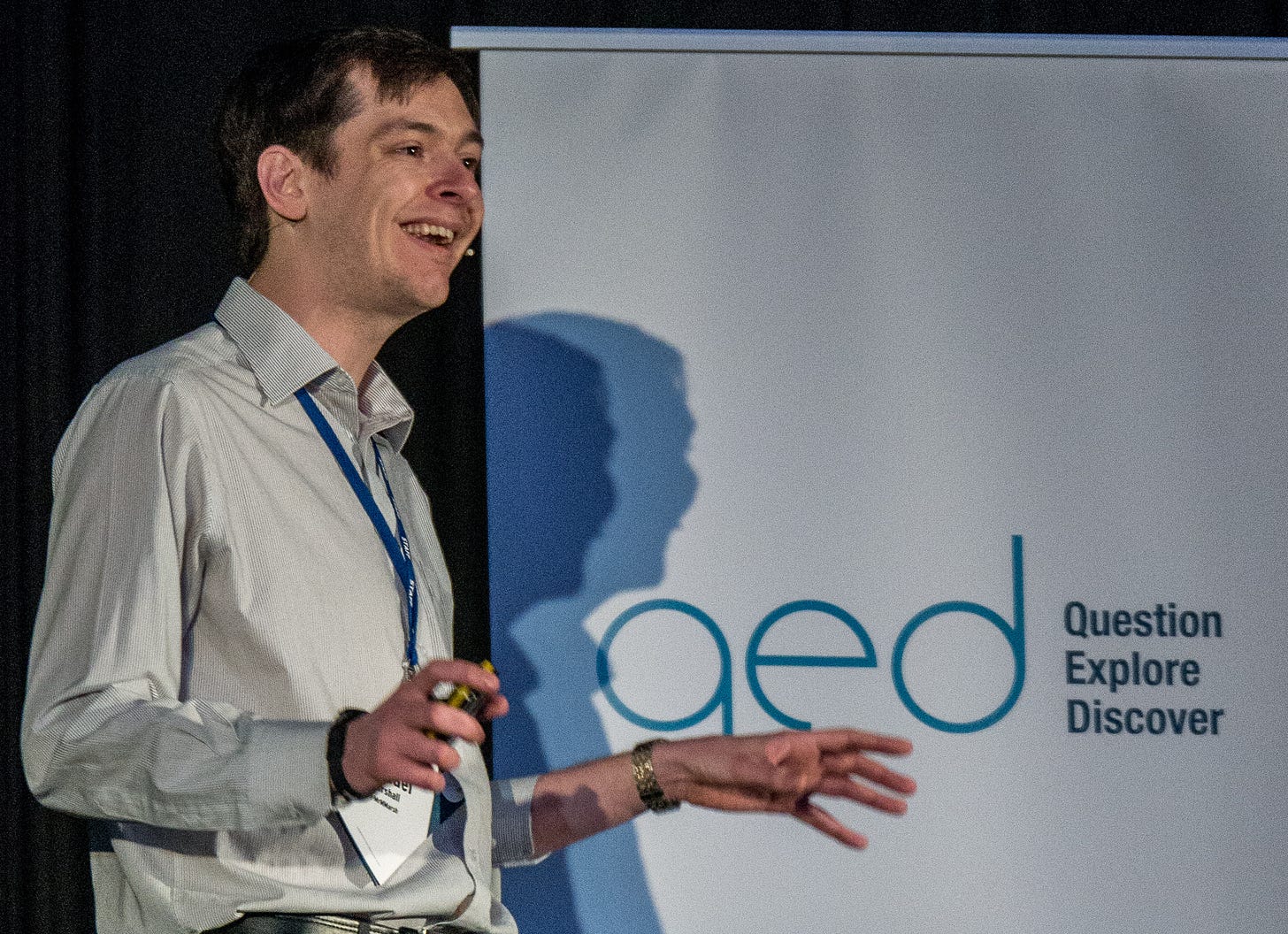Lewis believed Covid was a conspiracy. Then he changed his mind
An anti-vaxxer comes to terms with the white nationalist problem in his movement
Dear subscribers — today we’re sending something a little different. We’ve been spending some time with Lewis, an anti-vaccine campaigner from Liverpool who runs a 400-strong activist group. It is very rare for someone who strongly believes in conspiracy theories to step away from that world, but Lewis is beginning to do so. His story sheds light on how young men can get sucked into far-fetched conspiracy theories about sinister cabals running the world. He also talks about how the far-right has been syphoning off anti-vaxxers into their own white nationalist movements. A version of this article also appears in The Post, a Merseyside news site.
If you’re new to Scout, please hit subscribe and forward this email onto a few friends.
The conspiracy begins
There was no one moment when Lewis started believing in conspiracy theories but if anything’s to blame it was a 90s blockbuster starring Will Smith. Enemy of the State is a paranoid thriller in which Smith’s character uncovers a dangerous cabal at the heart of the US government. It’s got rooftop chases, murders, and a sinister deep state plan that goes all the way to the top. When Lewis was 10, he taped it off the TV and watched it more than a dozen times. Aged 17, he began checking out a new video-sharing site called YouTube, and noticed all these clips saying the Illuminati was secretly in charge of global affairs or that 9/11 was an inside job. Remembering the plot to Enemy of the State, Lewis realised he had a frame of reference for those YouTube videos. He thought: “Whoa! The government aren’t to be trusted. They’re the bad guys.”
Lewis is now 32 and one of the most active organisers in the anti-vaxx scene of Merseyside. He jokes that he is a “cosmic Scouser” — a Liverpudlian with an aptitude for researching arcane secret societies — and runs an activist group called Merseyside Resistance. They meet up once a week to hand out The Light, an anti-vaxx newspaper outside the local Hilton. (We wrote about how far-right figures have been published in The Light, and how its official social media channels have promoted Patriotic Alternative, the white nationalist organisation).
Sometimes Merseyside Resistance organises social meet-ups, where they hang out in the pub or each other’s homes. But the 400 members of Lewis’s group spend most of their time sharing Covid conspiracy theories on Telegram, a social media messaging app. Is the disease real? Are vaccines poisonous? Are lockdowns a tool of oppression? They also share non-Covid conspiracy theories, which all boil down to the idea that a small group of omnipotent people are in control of everything. Some of the funner ones claim the Pope is actually the Antichrist, that an alien invention called Tachyon Chambers can cure disease, and that Donald Trump and Princess Diana had a secret daughter called Sarah who lives in New Zealand and will one day be Queen. But there are also a lot of antisemitic conspiracy theories about Jewish families running global affairs and releasing Covid or enforcing punitive lockdown measures on unsuspecting gentiles.
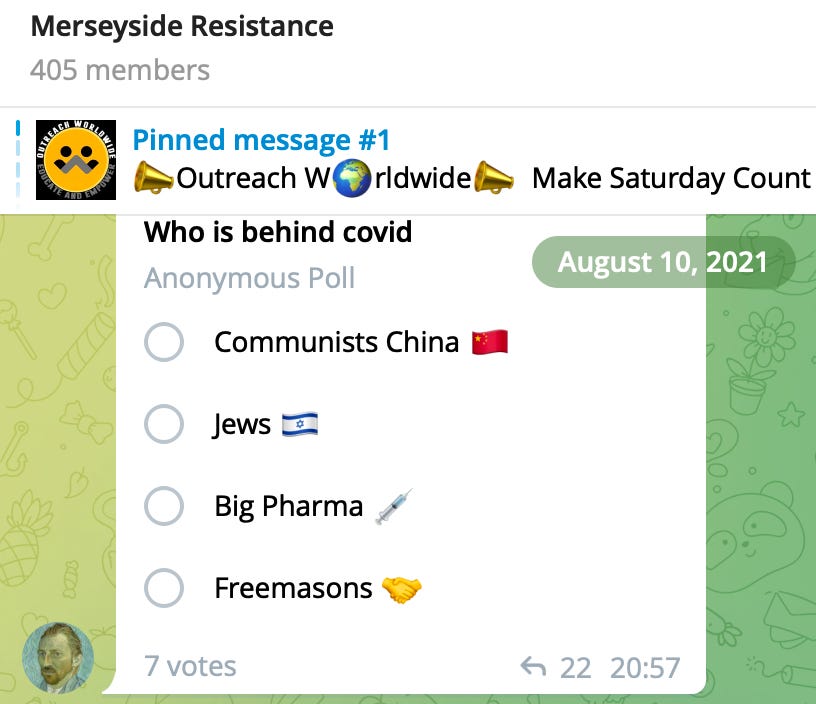
I got interested in Liverpool’s anti-vaxx movement while writing an article about activists harassing head teachers over Covid jabs last year. I saw that Lewis and his followers opposed this tactic and rankled at being associated with the more extreme organisers. He kindly agreed to meet up with me to discuss his activism.
I didn’t really have a plan for our interview but I was mindful of two things before we spoke. The first was that people who believe in conspiracy theories tend to feel like they possess a secret knowledge that makes them “awake”. Any contradictory evidence — for example that vaccines are safe or that Covid is real — can be dismissed as establishment propaganda. No fact, it would seem, can ever be convincing enough. Daniel Allington, a social scientist at King's College London, says it is vanishingly rare for someone who strongly believes in conspiracy theories to change their mind. He describes them as “lost” to reason, adding: “It’s accepted that there’s no point trying to argue with hardcore believers.”
The second thing is that I have my doubts about the efficacy of insulting anti-vaxxers as a means of persuasion. Take a glimpse at social media, and you’ll see a lot of tweets and posts calling anti-vaxxers “clueless”, “retarded”, and “scum of the earth”. Last month, a columnist for an American newspaper even wrote that mocking the Covid-related deaths of unvaccinated people was justified. It might be tempting for vaccinated people to vent their frustrations on people like Lewis (I’ve had three Covid jabs, and have certainly felt exasperated when hearing claims that vaccines are the mark of the devil). But your political views are heavily informed by your trusted friends and family and if a stranger calls you a moron on the internet it’s probably not going to convince you to hear them out.
So even if I had the statistical brain of Chris Witty and the argumentative powers of Atticus Finch, I didn’t think that I would be able to sway Lewis. I never expected that Lewis would come to meet me wearing a face mask, and over cappuccinos in the cafe underneath St George’s Hall, that he would tell me he may have been wrong all this time.
Rats in the night
Lewis is tall, smiley, and sports a Peaky Blinders haircut. He tells me has been into conspiracy theories for years and so we run through a list of popular ones. How about the Moon landings, I ask. Were they real? “I am more inclined to believe they were real,” he says. “But there are funny things about it.” Is there a New World Order? “It’s not an army but there are bureaucrats in the World Economic Forum who have an idea for a one-world government.” Was Diana murdered? “People should look at the evidence but I am not going to accuse anyone in high places of foul play.”
He says a lot of these things with a grin on his face, and that’s because leaving open the possibility that Prince Charles’s fingerprints were all over the 1997 Pont de l’Alma crash delivers a forbidden thrill. “When you have a boring life and are stuck in a boring job it can be very exciting to read these things,” he says. Lewis has worked as a bricklayer, an eBay trader, a quality assurance analyst, a firmware tester, and a cleaner. He is currently in between jobs and has signed on, hoping to find work in computing. It was during a night-time security job before the pandemic when conspiracy theories took over his life.
Back then, he endured 12-hour night shifts of lonely boredom that were occasionally punctuated by moments of screeching terror. Once, while guarding a construction site, Lewis nodded off and was woken up at 4am by a stranger pounding on the metal fences screaming to be let in so that he could throw himself off the roof. On a separate posting at a student dorm, a coked-up man booted in the front door bawling that he needed to see his sister in one of the rooms upstairs.
Otherwise weeks would pass and nothing would happen. He would spend hour after hour patrolling the same corners of gloomy buildings, shining his torch on giant rats that were guzzling discarded takeaway chips. Sometimes he noticed acid flashbacks dancing in the periphery of his vision. “Once all the tenants go to sleep you’re just like Jack Nicholson in The Shining, walking round buildings,” he says. “It drives you insane. You have got no stimulation. At first I was reading books to pass the time but I got so tired the words didn’t even make sense anymore. What else have you got except go on YouTube and look up conspiracy theories?”
The night work gave Lewis insomnia — which he still has — and heightened his paranoia. The conspiracy theories offering evidence about the existence and malfeasance of secret societies started to feel a bit like the night shifts — little moments of horror bursting through the tedium, proof that there was something very wrong with the world. Lewis heard that one of his colleagues in another building would bring in an Xbox and plug it into the bank of TVs used to monitor the security cameras — but Lewis didn’t want to break the rules too flagrantly and lose his job. So on his phone or an office computer, he cruised message boards, internet forums, and Telegram. That’s when he started hearing about this weird respiratory illness coming out of central China.
The resistance begins
At this time Lewis switched between thinking that the pandemic was real, looking at the cases appearing on the Johns Hopkins University tracking board, and thinking that it was a hoax, especially when lockdowns began shuttering life across Europe. Was the government using coronavirus as an excuse to take more power? He joined a national Covid conspiracy group called The White Rose, a group that frequently reposts content by Tommy Robinson, the far-right agitator. The group’s current membership is 62,000. A recent analysis of The White Rose revealed many of the links it shared came from white supremacist organisations and influencers.
In October 2020 he set up his own group, which has been through several iterations and is now called Merseyside Resistance. When he created the Telegram channel, Lewis wrote: “There is no censorship here and this will be totally laissez faire.” His idealism was challenged six months later when he noticed that antisemitic links were pouring into his group. Telegram’s architecture makes it very easy to share pictures, videos and links from other channels. Amid the hundreds of messages appearing every day, Lewis saw posts saying the Holocaust never happened, that Israel controls foreign governments and that Jews created the pandemic. Lewis wanted his group to have total free speech where his followers could have it out with each other and yet wanted it to be free from racism and other forms of bigotry. The centre would not hold.
Then Lewis realised that it wasn’t just a few of his followers dropping in the odd link about Jews being evil. It was a coordinated effort by far-right groups to syphon off his members. Activists from Patriotic Alternative, a white nationalist group headed by a self-described “Nazi-sympathiser”, said they were trying to recruit anti-vaxxers. Charlie Kearns, a Patriotic Alternative organiser from Merseyside, described in a video how he was trying to “make in-roads” into the anti-vaxx community. Driving in his car, speaking into his phone’s selfie camera, Kearns said the threat of “the Zionist liberal elite” required the cooperation of white nationalists and anti-vaxxers. “I would like to extend the hand and get some of the anti-vaxx people to come on our livestream to talk and build bridges between both of our camps and to hopefully one day in the near future merge our camps,” he explained.

Merseyside Resistance was getting out of hand. To prevent far-right content appearing in his group, Lewis installed software to block links from undesirable sources. Seventy-six channels are now blocked, but new groups always pop up using esoteric terminology to describe antisemitic conspiracy theories. For instance, instead of Jews, members would talk about the crimes of “Khazarians”, a Caucasian people falsely believed to be the ancestors of Ashkenazi Jews.
No matter how hard Lewis tries, white supremacist links continue to slip through the net. He says he has been approached by progressive activists — a Black Lives Matter organiser and a Liverpudlian drag queen — who were curious about getting involved in his group but were ultimately deterred by far-right entryism. Lewis also worries about impressionable teenagers being inadvertently exposed to racist ideas in his group. “It can happen, and I am vigilant about it,” he says. “When I recommend Telegram to someone, I think that the free speech aspect is really good – but then you’ve got the spammers and the far-right aspect to it. I don’t know what to do.”
It has also become stressful for Lewis. He says that Telegram has become “unhealthy” for him, and he spends way too much time on his channel, watching the deluge of messages flooding in, checking to see if they are going to be antisemitic. “Some days I have to switch it off,” he says. “It’s too much for one human being to deal with.” His parents worry that conspiracy theories have stopped being a hobby and become an obsession.
A week of turning points
As Lewis was grappling with how to moderate his group, Liverpool’s anti-vaxx scene was starting to change. It was becoming meaner, angrier, and more aggressive. A decisive week came in winter last year, when Lewis attended two events that went sour. The first was on November 29th, at a night organised by the Roscoe Circle, a discussion group whose guiding principles are "truth, reason, tolerance".
They invited four local politicians — a councillor from the Greens, another from the Lib Dems, and two representatives from the SDP and Reform UK — to debate vaccine passports. The event was held at the Quaker Meeting House, which was a fitting choice of venue because footage from the night shows four men sat on the stage resembling ancient Christians tied to posts in the Colosseum, waiting to be eaten by lions. Anti-vaxxers, mistaking these very minor politicians as architects of the New World Order, piled in.
One woman, after being given the floor, shouted about the inefficacy of PCR tests before flying off on a tangent about child abuse:
“I just want to ask youse lot up there one question. On the CDC website, it's informing us that the PCR tests cannot distinguish between a common cold, the flu and Covid-19. Therefore probably no-one that's been diagnosed with the Covid has actually had Covid. You're sitting there while our kids are getting abused! The lotta ya! You're sick!”
The second event was five days later on December 4th, when an anti-vaxx demonstration ended up in a branch of Tesco. At the time, the supermarket chain had been subjected to an activist boycott after their Christmas advert showed Santa Claus carrying a vaccine passport. At the demo, one of the protesters began aggressively shouting at the staff.
Lewis was unsettled by what he had seen that week. As he watched his fellow activists berating checkout assistants and local councillors, Lewis wondered if the genie had been let out of the bottle. “They were so obnoxious and adamant that they were correct,” he says. “That was a turning point for me. I was like, ‘Wow, is this what I'm aligned with now?’”
It was around this time that activists stole kit from a Covid testing centre and filmed themselves dumping it into bins. That same month, Piers Corbyn was arrested after telling a crowd to burn down the offices of MPs. Not long after, a video did the rounds on anti-vaxx social media that shows a group of activists accusing Sussex Police outside a pop-up clinic of facilitating genocide and attempting to place them under citizen’s arrest.
Defection
Lewis was thoroughly uncomfortable with what the anti-vaxx movement had become, and wanted to act. For a hardcore conspiracy theorist, what he did next would be tantamount to betrayal. He contacted the man who is the enemy of anti-vaxxers across the UK — Michael Marshall, co-founder of the Merseyside Skeptics Society which debunks junk science. Michael had recently published a series of articles exposing the far-right turn that The White Rose group had made, just when Lewis was noticing that his own channel was overrun by white nationalist content. Michael had been dropping into Merseyside Resistance and challenging the members on their views. In one exchange, Michael asked: “How many people do we think will die from the vaccine in the next three months?” And Lewis responded: “I can't put a number on it. I don't think all of them will. I just think millions.”
Anxious that he was speaking to the enemy, Lewis nonetheless opened a private conversation on Telegram with Michael. At first, he apologised for banning him for snooping on Merseyside Resistance, and said he was keen to chat about the movement and where it was headed. On his podcast, Be Reasonable, Michael interviews the wackiest flat earthers and herbal healers. He never makes fun of their beliefs but politely questions them, trying to get them to interrogate their own positions while defending them. Michael took this approach with Lewis, gently querying his views. Did he really have the statistics to back up the claims he was making? Were those stats being interpreted correctly? Was he sure?
Partly thanks to Michael’s conversations, Lewis came around to the idea that Covid was real. He looked at ONS data about deaths for the past few years, seeing an enormous spike in 2020 – meaning something had been killing Brits in large numbers. He kept going, accepting that masks can reduce the chance of infection. He stopped believing in QAnon, the sprawling American fantasy about satanic paedophiles running the government, after realising that none of the millenarian predictions it made had come true. After noticing that 48 million Brits have been fully jabbed and did not die, he came to realise that maybe vaccines weren’t so bad. He’s still mulling it over, but Lewis says he is now open to the idea of getting vaccinated. Leaving the security job has helped. Lewis says he has recently been sleeping better, and feels stronger in his mental health. “With all the data I’ve built a pattern of conclusion that is more balanced,” he says. “We do not have the proof to make these claims about vaccines being deliberately made to harm people.”
These might sound like pretty small conclusions to come to, especially as Lewis still isn’t jabbed. But given the lack of critical thinking in the anti-vaxx world, and how rare it is for someone to change their mind after years of swallowing conspiracy theories, these minor realisations were as momentous as epiphanies. Lewis says they did not come easily. “It can be hard when you’ve invested a lot of your time in an idea,” he explains. “It does hurt the ego to figure out that you’re wrong. But doubling down on things is never a good idea – the easiest person to fool is yourself.” Lewis praises Michael for his help, adding: “He alone has been a major factor in my position on things changing. He has challenged my beliefs in a way that a good friend would do.”
Michael says he will continue to encourage Lewis on his ideological journey. “He’s someone I hope in a few months time will step away from a lot of it,” he says, adding that Lewis has been damaging his mental health by being involved in the anti-vaxx movement. “He genuinely wants to be as close to reality as possible. His instincts are leading him to sense-check what he’s seeing, certainly at the moment. He’s pulling back from that world.”
Cracking on
Lewis now faces an uncertain future in the movement. A week after we met, he left Merseyside Outreach, a secret Telegram channel for the region’s most active anti-vaxx campaigners. Merseyside Outreach had decided to team up with Liverpool People’s Resistance, an 800-strong activist group that harassed head teachers over Covid jabs last year, I wrote about a few months ago. Liverpool People’s Resistance contains videos of Adolf Hitler’s speeches and references to the Great Replacement, the belief that white people are under threat from Jews who are organising the migration of Asians and Africans into Europe. After hearing that Merseyside Outreach and Liverpool People’s Resistance were both organising a rally outside the Royal Hospital, Lewis quit. He didn’t want to be associated with them anymore.
He now fears that the anti-vaxx scene, in which he has a lot of friends, is becoming too violent for him. “I’m afraid that the most extreme voices are becoming the most dominant ones, and that this has been the case for a while now,” he says. He anticipates a day in the near future when his stance on vaccines and his calls for moderation will earn him the title of “shill” for Big Pharma and make his leadership role untenable.
The funny thing is, Lewis is almost looking forward to that day. He even speaks about it in the present tense. “I can just crack on with my life,” he says. “The activism has taken over. I’m going to get a job and worry about bettering myself instead rather than just being online all the time.”
On the morning we meet, Lewis is gearing up for a demonstration called “Worldwide Rally for Freedom: Mass Non-Compliance”. It’s the last anti-vaxx protest he’s going to attend – he can’t say forever, but certainly for now. He’s been nervous that far-right agitators will turn up and cause trouble, or that other activists within the anti-vaxx movement will make speeches in favour of white nationalism. When we get to St John’s Gardens, where around 1,000 people are massed, we notice an activist distributing leaflets advertising For Britain, a far-right party that campaigns for Muslim immigrants to be deported. A skinhead wearing camouflage trousers arrives carrying an England flag – Lewis clocks him as an old member of the BNP – and is hustled out of the protest.
If he stays involved in Merseyside Resistance, Lewis hopes that he will be able to steer it in a more moderate direction. He now calls himself vaccine hesitant - which loosely describes someone who isn’t necessarily against jabs but wants to delay getting this one. However, the activists I met from his group believed Covid jabs are being deliberately filled with toxic chemicals. Lewis introduced me to his friends gathering outside for the demonstration, who were thrilled at the large turnout. Matthew, a 51-year-old government worker, told me vaccines are “an attack on the whole of humanity”. Larry Reynolds, a 52-year-old entrepreneur, dismissed government guidance as “propaganda”. Krista, a 62-year-old natural therapist who practises something called vibrational healing, compared the national Covid response to the oppressive communist regime that her Hungarian father fled. Matthew, Larry, and Krista all beamed when discussing Merseyside Resistance and the community they found in each other. Krista called it “a family” and “a life saver” during the lockdowns that kept them isolated from their friends.
The social bonds that tie Merseyside Resistance together could make it hard for Lewis to leave. He says that the group has been helpful to him psychologically and that he enjoys spending time with its members. He now faces being stuck in a no-man’s-land. Because he’s not yet committed to getting jabbed, there will still be people who think he’s a misguided anti-vaxxer. And while he has friends outside the conspiracy world, if he quits Merseyside Resistance, he’ll lose the activist companions he speaks to every day.
The last we see of each other on the afternoon of the protest is on Castle Street. Hundreds of people are streaming past us chanting about resistance, defiance, and non-compliance. Whenever a car beeps its horn, the crowd cheers. If someone walks past wearing a face mask, the protesters shout at them to take it off. A QAnon sign flashes ahead, warning of a coming storm. We say goodbye, and Lewis rejoins the march as it heads to the docks. When we next speak, I ask if he would ever push the self-detonate button on Merseyside Resistance? “If it got out of hand,” he says. “If everyone got completely suckered into extremist views and they were willing to take action on those views and I couldn’t stop them.” He pauses. “But I don’t think that’s going to happen.”

